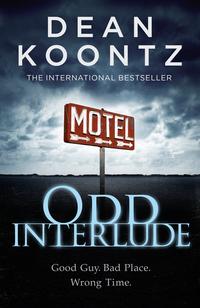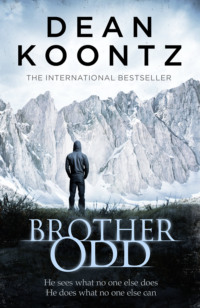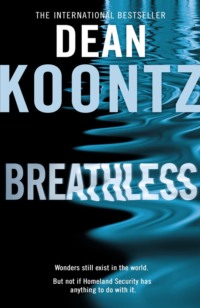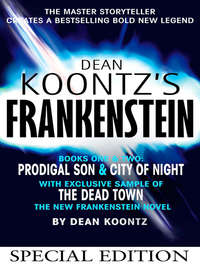
Полная версия
The Face
Wind threw sheets, lashed whips, spun funnels of rain. Rain hissed, sizzled, chuckled, splashed.
Corky’s phone rang.
He was still half a block from his car. He would miss the call if he waited to answer it in the BMW.
He slipped his right arm out of its sleeve, under his slicker, and unclipped the phone from his belt.
Arm in sleeve again, phone to ear, toddling along as buttercup-yellow and as smile-evoking as any character in any TV program for children, Corky Laputa was in such a good mood that he answered the call by saying, “Brighten the corner where you are.”
The caller was Rolf Reynerd. As thick as Corky was yellow, Rolf thought he’d gotten a wrong number.
“It’s me,” Corky said quickly, before Reynerd could hang up.
By the time he reached the BMW, he wished he had never answered the phone. Reynerd had done something stupid.
CHAPTER 10
BEYOND THE RESTAURANT WINDOW, falling rain as clear as a baby’s conscience met the city pavement and flooded the gutters with filthy churning currents.
Studying the photo of the jar full of foreskins, Hazard said, “Ten little hats from ten little proud heads? You think they could be trophies?”
“From men he’s murdered? Possible but unlikely. Anybody with that many kills isn’t the kind to taunt his victims first with freaky gifts in black boxes. He just does the job.”
“And if they were trophies, he wouldn’t give them away so easy.”
“Yeah. They’d be the central theme of his home decor. What I think is he works with stiffs. Maybe in a funeral home or a morgue.”
“Postmortem circumcisions.” Hazard twisted some string cheese onto his fork as he might have spun up a bite of spaghetti. “Kinky, but it’s got to be the answer, ’cause I haven’t heard about ten unsolved homicides where it looks like the perp might be a lunatic rabbi.” He dunked the string cheese in lebne and continued with lunch.
Ethan said, “I think he harvested these from cadavers for the sole purpose of sending them to Channing Manheim.”
“To convey what—that Chan the Man is a prick?”
“I doubt the message is that simple.”
“Fame doesn’t seem so appealing anymore.”
The fourth black box had been larger than the others. Two photos were required to document the contents.
In the first picture stood a honey-colored ceramic cat. The cat stood on its hind paws and held a ceramic cookie in each forepaw. Red letters on its chest and tummy spelled COOKIE KITTEN.
“It’s a cookie jar,” Ethan said.
“I’m such a good detective, I figured that out all by myself.”
“It was filled with Scrabble tiles.”
The second photo showed a pile of tiles. In front of the pile, Ethan had used six pieces to spell OWE and WOE.
“The jar contained ninety of each letter: O, W, E. Either word could be spelled ninety times, or both words forty-five times side by side. I don’t know which he intended.”
“So the nutball is saying, ‘I owe you woe.’ He thinks somehow Manheim has done him wrong, and now it’s payback time.”
“Maybe. But why in a cookie jar?”
“You could also spell wow,” Hazard noted.
“Yeah, but then you’re left with half the Os and all the Es not used, and they don’t make anything together. Only owe or woe uses all the letters.”
“What about two-word combinations?”
“The first one is wee woo. Which could mean ‘little love,’ I guess, but I don’t get the message in that one. The second is E-W-E, and woo again.”
“Sheep love, huh?”
“Seems like a dead end to me. I think owe woe is what he intended, one or the other, or both.”
Smearing lebne on a slice of lahmajoon flatbread, Hazard said, “Maybe after this we can play Monopoly.”
The fifth black box had contained a hardcover book titled Paws for Reflection. The cover featured a photo of an adorable golden retriever puppy.
“It’s a memoir,” Ethan said. “The guy who wrote it—Donald Gainsworth—spent thirty years training guide dogs for the blind and service dogs for people confined to wheelchairs.”
“No bugs or foreskins pressed between the pages?”
“Nope. And I checked every page for underlining, but nothing was highlighted.”
“It’s out of character with the rest. An innocuous little book, even sweet.”
“Box number six was thrown over the gate a little after three-thirty this morning.”
Hazard studied the last two photos. First, the sutured apple. Then the eye inside. “Is the peeper real?”
“He pried it out of a doll.”
“Nevertheless, this one disturbs me most of all.”
“Me too. Why you?”
“The apple’s the most crafted of the six. It took a lot of care, so it’s probably the one he finds most meaningful.”
“So far it doesn’t mean much to me,” Ethan lamented.
Stapled to the last photograph was a Xerox of the typewritten message that had been folded in the seed pocket, under the eye. After reading it twice, Hazard said, “He didn’t send anything like this with the first five packages?”
“No.”
“Then this is probably the last thing he’s sending. He’s said everything he wants to say, in symbols and now in words. Now he moves from threats to action.”
“I think you’re right. But the words are as much of a riddle as the symbols, the objects.”
With silvery insistence, headlights cleaved the afternoon gloom. Radiant wings of water flew up from the puddled pavement, obscuring the tires and lending an aura of supernatural mission to the vehicles that plied the currents of Pico Boulevard.
After a brooding silence, Hazard said, “An apple might symbolize dangerous or forbidden knowledge. The original sin he mentions.”
Ethan tried his salmon and couscous again. He might as well have been eating paste. He put down his fork.
“The seeds of knowledge have been replaced by the eye,” Hazard said, almost more to himself than to Ethan.
A flock of pedestrians hurried past the restaurant windows, bent forward as if resisting a wind greater than the one that the December day exhaled, under the inadequate protection of black umbrellas, like mourners quickening to a grave.
“Maybe he’s saying, ‘I see your secrets, the source— the seeds—of your evil.’”
“I had a similar thought. But it doesn’t feel entirely right, and it doesn’t lead me anywhere useful.”
“Whatever he means by it,” Hazard said, “it bothers me that you have this eye in the apple come just after this book about a guy who raised guide dogs for the blind.”
“If he’s threatening to blind Manheim, that’s bad enough,” said Ethan, “but I think he intends worse.”
After shuffling through the photos once more, Hazard returned them to Ethan and again addressed the seafood tagine with gusto. “I assume you’ve got your man well covered.”
“He’s filming in Florida. Five bodyguards travel with him.”
“You don’t?”
“Not usually. I oversee all security operations from Bel Air. I talk to the head road warrior at least once a day.”
“Road warrior?”
“That’s Manheim’s little joke. It’s what he calls the bodyguards who travel with him.”
“That’s a joke? I fart funnier than he talks.”
“I never claimed he was the king of comedy.”
“When somebody tossed the sixth box over the gate last night,” Hazard asked, “who was the somebody? Any security tape?”
“Plenty. Including a clear shot of his license plate.”
Ethan told him about Rolf Reynerd—though he didn’t mention his encounters with the man, neither the one that he knew to be real nor the one that he seemed to have dreamed.
“And what do you want from me?” Hazard asked.
“Maybe you could check him out.”
“Check him out? How far? You want me to hold his privates while he turns his head and coughs?”
“Maybe not that far.”
“You want I should look for polyps in his lower colon?”
“I already know he doesn’t have any criminal priors—”
“So I’m not the first one you’re calling in a favor from.”
Ethan shrugged. “You know me, I’m a user. No one’s safe. It’d be useful to know, does Reynerd have any legally registered firearms.”
“You been talking to Laura Moonves over in Support Division?”
“She was helpful,” Ethan admitted.
“You should marry her.”
“She didn’t give me that much on Reynerd.”
“Even all us morons can see you and her would be as right as bread and butter.”
“We haven’t even dated in eighteen months,” Ethan said.
“That’s because you’re not as smart as us morons. You’re just an idiot. So don’t jive me. Moonves could get firearm registrations for you. That’s not what you want from me.”
While Hazard concentrated on lunch, Ethan gazed into the false twilight of the storm.
After two winters of below-average rainfall, the climatological experts had warned that California was in for a long and disastrous dry spell. As usual, the ensuing dire stories of drought, flooding the media, had proved to be sure predictors of a drowning deluge.
The pregnant belly of the sky hung low and gray and fat, and water broke to announce the birth of still more water.
“I guess what I want from you,” Ethan said at last, “is to take a look at the guy up close and tell me what you think of him.”
As perceptive as ever, Hazard said, “You’ve already knocked on his door, haven’t you?”
“Yeah. Pretended I’d come to see who lived there before him.”
“He creeped you out. Something way different about him.”
“You’ll see it or you won’t,” Ethan said evasively.
“I’m a homicide cop. He’s not a suspect in any killing. How do I justify this?”
“I’m not asking for an official visit.”
“If I don’t wave a badge, I won’t get past the doorstep, not as mean as I look.”
“If you can’t, you can’t. That’s okay.”
When the waitress arrived to ask if they wanted anything more, Hazard said, “I love those walnut mamouls. Give me six dozen to go.”
“I like a man with a big appetite,” she said coyly.
“You, young lady, I could gobble up in one bite,” Hazard said, eliciting from her a flush of erotic interest and a nervous laugh.
When the waitress went away, Ethan said, “Six dozen?”
“I like cookies. So where does this Reynerd live?”
Earlier, Ethan had written the address on a slip of paper. He passed it across the table. “If you go, don’t go easy.”
“Go what—in a tank?”
“Just go ready.”
“For what?”
“Probably nothing, maybe something. He’s either high wired or a natural-born headcase. And he’s got a pistol.”
Hazard’s gaze tracked across Ethan’s face as though reading his secrets as readily as an optical scanner could decipher any bar pattern of Universal Product Code. “Thought you wanted me to check for gun registration.”
“A neighbor told me,” Ethan lied. “Says Reynerd’s a little paranoid, keeps the piece close to himself most of the time.”
While Ethan returned the computer-printed photos to the manila envelope, Hazard stared at him.
The papers didn’t seem to fit in the envelope at first. Then for a moment the metal clasp was too large to slip through the hole in the flap.
“You have a shaky envelope there,” said Hazard.
“Too much coffee this morning,” Ethan said, and to avoid meeting Hazard’s eyes, he surveyed the lunchtime crowd.
The flogged air of human voices flailed through the restaurant, beat against the walls, and what seemed, on casual attention, to be a celebratory roar sounded sinister when listened to with a more attentive ear, sounded now like the barely throttled rage of a mob, and now like the torment of legions under some cruel oppression.
Ethan realized that he was searching face to face for one face in particular. He half expected to see toilet- drowned Dunny Whistler, dead but eating lunch.
“You’ve hardly touched your salmon,” Hazard said in a tone of voice as close as he could ever get to motherly concern.
“It’s off,” Ethan said.
“Why didn’t you send it back?”
“I’m not that hungry, anyway.”
Hazard used his well-worn fork to sample salmon. “It’s not off.”
“It tastes off to me,” Ethan insisted.
The waitress returned with the lunch check and with pink bakery boxes full of walnut mamouls packed in a clear plastic bag bearing the restaurant’s logo.
While Ethan fished a credit card from his wallet, the woman waited, her face a clear window to her thoughts. She wanted to flirt more with Hazard, but his daunting appearance made her wary.
As Ethan returned the check with his American Express plastic, the waitress thanked him and glanced at Hazard, who licked his lips with theatrical pleasure, causing her to scurry off like a rabbit that had been so flattered by a fox’s admiration that she had almost offered herself for dinner before recovering her survival instinct.
“Thanks for picking up the check,” Hazard said. “Now I can say Chan the Man took me to lunch. Though I think these mamouls are going to turn out to be the most expensive cookies I ever ate.”
“This was just lunch. No obligations. Like I said, if you can’t, you can’t. Reynerd’s my problem, not yours.”
“Yeah, but you’ve got me intrigued now. You’re a better flirt than the waitress.”
Midst a clutter of darker emotions, Ethan found a genuine smile.
A sudden change in the direction of the wind threw shatters of rain against the big windows.
Beyond the hard-washed glass, pedestrians and passing traffic appeared to melt into ruin as though subjected to an Armageddon of flameless heat, a holocaust of caustic acid.
Ethan said, “If he’s carrying a potato-chip bag, corn chips, anything like that, there might be more than snack food in it.”
“This the paranoid part? You said he keeps his piece close.”
“That’s what I heard. In a potato-chip bag, places like that, where he can reach for it, and you don’t realize what he’s doing.”
Hazard stared at him, saying nothing.
“Maybe it’s a nine-millimeter Glock,” Ethan added.
“He have a nuclear weapon, too?”
“Not that I know of.”
“Probably keeps the nuke in a box of Cheez-Its.”
“Just take a bagful of mamouls, and you can handle anything.”
“Hell, yeah. Throw one of these, you’d crack a guy’s skull.”
“Then eat the evidence.”
The waitress returned with his credit card and the voucher.
As Ethan added the gratuity and signed the form, Hazard seemed almost oblivious of the woman and did not once look at her.
With needles of rain, the blustering wind tattooed ephemeral patterns on the window, and Hazard said, “Looks cold out there.”
That was exactly what Ethan had been thinking.
CHAPTER 11
SLICKERED AND BOOTED, WEARING THE same jeans and wool sweater as before, sitting behind the wheel of his silver BMW, Corky Laputa felt stifled by a frustration as heavy and suffocating as a fur coat.
Although his shirt wasn’t buttoned to the top, anger pinched his throat as tight as if he’d squeezed his sixteen-inch neck into a fifteen-inch collar.
He wanted to drive to West Hollywood and kill Reynerd.
Such impulses must be resisted, of course, for though he dreamed of a societal collapse into complete lawlessness, from which a new order would arise, the laws against murder remained in effect. They were still enforced.
Corky was a revolutionary, but not a martyr.
He understood the need to balance radical action with patience.
He recognized the effective limits of anarchic rage.
To calm himself, he ate a candy bar.
Contrary to the claims of organized medicine, both the greed-corrupted Western variety and the spiritually smug Eastern brand, refined sugar did not make Corky hyperkinetic. Sucrose soothed him.
Very old people, nerves rubbed to an excruciating sensitivity by life and its disappointments, had long known about the mollifying effect of excess sugar. The farther their hopes and dreams receded from their grasp, the more their diets sweetened to include ice cream by the quart, rich cookies in giant economy-size boxes, and chocolate in every form from nonpareils to Hershey’s Kisses, even to Easter-basket bunnies that they could brutally dismember and consume for a double enjoyment.
In her later years, his mother had been an ice-cream junkie. Ice cream for breakfast, lunch, dinner. Ice cream in parfait glasses, in huge bowls, eaten directly from the carton.
She hogged down enough ice cream to clog a network of arteries stretching from California to the moon and back. For a while Corky had assumed that she was committing suicide by cholesterol.
Instead of spooning herself into heart failure, she appeared to grow healthier. She acquired a glow in the face and a brightness in the eyes that she’d never had before, not even in her youth.
Gallons, barrels, troughs of Chocolate Mint Madness, Peanut-Butter-and-Chocolate Fantasy, Maple Walnut Delight, and a double dozen other flavors seemed to turn back her biological clock as the waters of a thousand fountains had failed to turn back that of Ponce de Leon.
Corky had begun to think that in the case of his mother’s unique metabolism, the key to immortality might be butterfat. So he killed her.
If she had been willing to share some of her money while still alive, he would have allowed her to live. He wasn’t greedy.
She had not been a believer in generosity or even in parental responsibility, however, and she cared not at all about his comfort or his needs. He’d been concerned that eventually she would change her will and stiff him forever, sheerly for the pleasure of doing so.
In her working years, his mother had been a university professor of economics, specializing in Marxist economic models and the vicious departmental politics of academia.
She had believed in nothing more than the righteousness of envy and the power of hatred. When both beliefs proved hollow, she had not abandoned either, but had supplemented them with ice cream.
Corky didn’t hate his mother. He didn’t hate anyone.
He didn’t envy anyone, either.
Having seen those gods fail his mother, he had rejected both. He did not wish to grow old with no comfort but his favorite premium brand of coconut fudge.
Four years ago, paying her a secret visit with the intention of quickly and mercifully smothering her in her sleep, he had instead beaten her to death with a fireplace poker, as if he were acting out a story begun by Anne Tyler in an ironic mood and roughly finished by a furious Norman Mailer.
Though unplanned, the exercise with the poker proved cathartic. Not that he’d taken pleasure in the violence. He had not.
The decision to murder her had really been as unemotional as any decision to purchase the stock of a blue-chip corporation, and the killing itself had been conducted with the same cool efficiency with which he would have executed any stock-market investment.
Being an economist, his mother surely had understood.
His alibi had been unassailable. He inherited her estate. Life went on. His life, anyway.
Now, as he finished the candy bar, he felt sugar-soothed and chocolate-coddled.
He still wanted to kill Reynerd, but the unwise urgency of the compulsion had passed. He would take time to plan the hit.
When he acted, he would follow his scheme faithfully. This time, pillow would not become poker.
Noticing that the yellow slicker had shed a lot of water on the seat, he sighed but did nothing. Corky was too committed an anarchist to care about the upholstery.
Besides, he had Reynerd to brood about. A perpetual adolescent inside a dour exterior, Rolf had been unable to resist the temptation to deliver the sixth box in person. Looking for a thrill.
The fool had thought that perimeter security cameras did not exist solely because he himself could not spot them.
Are there no other planets in the solar system, Corky had asked him, just because you can’t locate them in the sky?
When Ethan Truman, Manheim’s security chief, came calling, Reynerd had been stunned. By his admission, he behaved suspiciously.
As Corky wadded up the candy wrapper and stuffed it into the trash bag, he wished that he could dispose of Reynerd as easily.
Suddenly rain fell more heavily than at any previous moment of the storm. The deluge knocked stubborn acorns from the oak under which he had parked, and cast them across the BMW. They rattled off the paint work and surely marred it, snapped off the windshield but did not crack it.
He didn’t have to sit here, in a danger of acorns, plotting Reynerd’s demise, until a rotting thousand-pound limb broke free, fell on the car, and crushed him for his trouble. He could get on with his day and mentally draw up blueprints for the murder while he attended to other business.
Corky drove a few miles to a popular upscale shopping mall and parked in the underground garage.
He got out of the BMW, stripped off his slicker and his droopy rain hat, which he tossed onto the floor of the car. He shrugged into a tweed sports coat that complemented his sweater and jeans.
An elevator carried him from subterranean realms to the highest of two floors of shops, restaurants, and attractions. The arcade was on this top level.
With school out, kids crowded around the arcade games. Most were in their early teens.
The machines beeped, rang, tolled, chimed, bleated, tweedled, whistled, rattattooed, boomed, shrieked, squealed, ululated, roared like gunning engines, emitted scraps of bombastic music, the screams of virtual victims, twinkled, flashed, strobed, and scintillated in all known colors, and swallowed quarters, dollars, more voraciously even than the iconic Pac-Man had once gobbled cookies off a million arcade screens in an era now quaint if not unknown to the current crowd.
Wandering among the machines, Corky distributed free drugs to the kids.
These small plastic bags each contained eight doses of Ecstasy—or Extasy, if you’d gone to a public school—with a block-lettered label that promised FREE X, and then suggested, JUST REMEMBER WHO YOUR FRIEND IS.
He was pretending to be a dealer drumming up business. He never expected to see any of these brats again.
Some kids accepted the packets, thought it was cool.
Others showed no interest. Of those who declined, none made an effort to report him to anyone; nobody liked a rat.
In a few instances, Corky slipped the bags into kids’ jacket pockets without their knowledge. Let them find it later, be amazed.
Some would take the stuff. Some would throw it away or give it away. In the end, he would have succeeded in contaminating a few more brains.
Truth: He wasn’t interested in creating addicts. He would have given away heroin or even crack cocaine if that had been his goal.
Scientific studies of Ecstasy revealed that five years after taking just a single dose, the user continued to exhibit lingering changes in brain chemistry. After regular use, permanent brain damage could ensue.
Some oncologists and neurologists suggested that in the decades to come, the current high incidence of Ecstasy use would produce a dramatic increase in early-onset cancerous brain tumors, as well as a decrease in the cognitive abilities of hundreds of thousands if not millions of citizens.
Eight-dose giveaways like this would not facilitate the collapse of civilization overnight. Corky was committed to long-term effect.
He never carried more than fifteen bags, and once he started to hand them out, he made a point of ridding himself of them quickly. Too clever to get caught holding, he was in and out of the arcade in three minutes.







